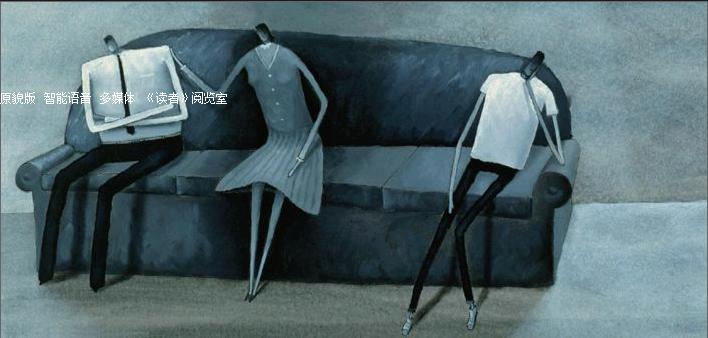Flowering Judas——信仰的失落,灵魂的虚无

凯瑟琳·安妮·波特(Katherine Anne Porter, 1890~1980)是美国20世纪最为优秀的短篇小说家之一。她出生于美国得克萨斯州的小镇印第安克里克,两岁时丧母,由祖母抚养至11岁,祖母去世后,寄宿于天主教会学校读书。16岁时,波特辍学,同约翰·亨利·孔茨结婚,但婚姻生活持续时间并不长,1915年两人离婚。1914年,波特来到芝加哥追求演艺生涯,不久后开始在当地报社供职。1922年她发表了第一篇短篇小说。1930年,波特出版了第一部短篇小说集《开花的犹大树》(Flowering Judas and Other Stories),其后又出版了中篇小说《中午酒》(Noon Wine)、中短篇小说集《灰色马,灰色的骑手》(Pale Horse, Pale Rider),以及长篇小说《愚人船》(Ship of Fools)等。在波特的小说中,她通常选取自己所熟悉的得克萨斯州、墨西哥等地区的人物为描摹对象,文笔细腻而富含诗意,象征意义丰富,尤其擅长对女性人物的心理刻画。
Excerpts1)
Braggioni sits heaped upon the edge of a straight-backed chair much too small for him, and sings to Laura in a furry2), mournful voice. Laura has begun to find reasons for avoiding her own house until the latest possible moment, for Braggioni is there almost every night. No matter how late she is, he will be sitting there with a surly, waiting expression, pulling at his kinky3) yellow hair, thumbing the strings of his guitar, snarling4) a tune under his breath. Lupe the Indian maid meets Laura at the door, and says with a flicker of a glance towards the upper room, “He waits.”
Laura wishes to lie down. She is tired of her hairpins and the feel of her long tight sleeves, but she says to him, “Have you a new song for me this evening?” If he says yes, she asks him to sing it. If he says no, she remembers his favorite one, and asks him to sing it again. Lupe brings her a cup of chocolate and a plate of rice, and Laura eats at the small table under the lamp, first inviting Braggioni, whose answer is always the same: “I have eaten, and besides, chocolate thickens the voice.”
Laura says, “Sing, then,” and Braggioni heaves himself into song. He scratches the guitar familiarly as though it were a pet animal, and sings passionately off key, taking the high notes in a prolonged painful squeal5). Laura, who haunts the markets listening to the ballad singers, and stops every day to hear the blind boy playing his reed-flute in Sixteenth of September Street, listens to Braggioni with pitiless courtesy, because she dares not smile at his miserable performance. Nobody dares to smile at him. Braggioni is cruel to everyone, with a kind of specialized insolence6), but he is so vain of his talents, and so sensitive to slights7), it would require a cruelty and vanity greater than his own to lay a finger on the vast cureless wound of his self-esteem. It would require courage, too, for it is dangerous to offend him, and nobody has this courage.
Braggioni loves himself with such tenderness and amplitude and eternal charity that his followers—for he is a leader of men, a skilled revolutionist, and his skin has been punctured in honorable warfare—warm themselves in the reflected glow, and say to each other: “He has a real nobility, a love of humanity raised above mere personal affections.” The excess of this self-love has flowed out, inconveniently for her, over Laura, who, with so many others, owes her comfortable situation and her salary to him. When he is in a very good humor, he tells her, “I am tempted to forgive you for being a gringa8). Gringita!” and Laura, burning, imagines herself leaning forward suddenly, and with a sound back-handed slap wiping the suety smile from his face. If he notices her eyes at these moments he gives no sign.
She knows what Braggioni would offer her, and she must resist tenaciously9) without appearing to resist, and if she could avoid it she would not admit even to herself the slow drift of his intention. During these long evenings which have spoiled a long month for her, she sits in her deep chair with an open book on her knees, resting her eyes on the consoling rigidity of the printed page when the sight and sound of Braggioni singing threaten to identify themselves with all her remembered afflictions and to add their weight to her uneasy premonitions10) of the future. The gluttonous bulk of Braggioni has become a symbol of her many disillusions, for a revolutionist should be lean, animated by heroic faith, a vessel of abstract virtues. This is nonsense. She knows it now and is ashamed of it. Revolution must have leaders, and leadership is a career for energetic men. She is, her comrades tell her, full of romantic error, for what she defines as cynicism in them is merely “a developed sense of reality.” She is almost too willing to say, “I am wrong, I suppose I dont really understand the principles,” and afterward she makes a secret truce11) with herself, determined not to surrender her will to such expedient logic. But she cannot help feeling that she has been betrayed irreparably by the disunion between her way of living and her feeling of what life should be, and at times she is almost contented to rest in this sense of grievance as a private store of consolation. Sometimes she wishes to run away, but she stays. Now she longs to fly out of this room, down the narrow stairs, and into the street where the houses lean together like conspirators under a single mottled lamp, and leave Braggioni singing to himself. Instead she looks at Braggioni, frankly and clearly, like a good child who understands the rules of behavior.
1. 英文节选部分选自小说开篇,主要描写了每晚黄昏时分,小说主人公布拉焦尼(Braggioni)在劳拉(Laura)家弹着吉他为她唱歌的情景。劳拉虽然不爱听,但却没有表现出拒绝的神情。
2. furry [?f??ri] adj. 沙哑的
3. kinky [?k??ki] adj. (头发等)弯曲的,卷曲的
4. snarl [snɑ?(r)l] vt. (人)咆哮,吼叫
5. squeal [skwi?l] n. 长而尖的声音;尖叫声
6. insolence [??ns?l?ns] n. 傲慢;傲慢无礼的行为
7. slight [sla?t] n. 轻视;冷落
8. gringa [‘ɡri?ɡ?] n. [贬义]外国女人(西班牙人和拉丁美洲人用以称呼美英血统的人)
9. tenaciously [t??ne???sli] adv. 顽固地,坚持地
10. premonition [?prem??n??(?)n] n. (尤指不祥的)预兆,预感
11. truce [tru?s] n. 讲和(协议);休战,停战(协定)
作品赏析
墨西哥在20世纪初有过风云变幻的革命时代。曾是西班牙殖民地的墨西哥,19世纪在民族运动的影响下推翻殖民政权,赢得独立,却没有迎来民主,此后数十年一直处在代表大资产阶级的独裁政府统治之下。进入20世纪,随着农民反剥削意识的觉醒以及工人队伍的日益壮大,以平等和民主为诉求的革命运动风起云涌,热潮一直延续到了20世纪30年代。凯瑟琳·安妮·波特虽然是美国作家,但她对墨西哥并不陌生,她出生并成长的得克萨斯州与墨西哥接壤,青年时代的她支持墨西哥革命,曾于20世纪20年代数次深入墨西哥并且参与当地的革命事业。因此,在她开始小说创作时,这一段亲身经历自然而然地成为她的写作素材,促使她完成了一系列和墨西哥有关的小说,《开花的犹大树》就是其中最为著名的一篇。
小说中,美国女子劳拉来到墨西哥,成为墨西哥工人城市革命的支持者。她白天教墨西哥儿童学英文,晚上替革命者传递消息。她的美丽吸引来了仰慕者,革命的灵魂人物布拉焦尼以及年轻的墨西哥小伙欧亨尼奥都在热烈追求她。然而,布拉焦尼是有妇之夫,在小说的结尾,他放弃了对劳拉的追求,回到了妻子的身边。而欧亨尼奥则因参与革命入狱,在狱中自杀身亡。劳拉在噩梦中见到了欧亨尼奥以死神的形象出现,递给了她象征背叛的犹大花。从故事情节的概述中我们能够看出,小说虽然以墨西哥革命为背景,重点却没有放在展示革命的波澜壮阔上,也没有力图展现革命者执着的信念追求。相反,小说关心的是人物的情感与内心世界。实际上,故事是在借用革命如火如荼的热,反衬人生虚无空洞的冷。
在小说《开花的犹大树》中,几乎所有的主要人物都有虚无主义的倾向。首先是布拉焦尼。他虽然是革命的领导者,用富有感染力的语言鼓动人心,为大家勾勒未来的美好愿景,但实际上他并不相信革命。对他来说,革命只是攫取权力的手段,为此,他用嘲讽的冷眼看着革命群众的追随与投入。至于欧亨尼奥,他才19岁,却体会到了人生的倦怠感。他爱上了不爱他的劳拉,感情得不到回报,追随了不值得信任的布拉焦尼,投身革命却成为没有意义的牺牲品。他为革命献身,身陷囹圄,布拉焦尼出于私心,迟迟不肯营救他出狱。他感到幻灭,选择了离开这个世界,服用了劳拉探监时带来的安眠药,自杀身亡,一条鲜活的生命自此枯萎。
然而,在这些人物中,最能体现虚无主义的是劳拉。小说带我们深入劳拉的内心,透过她的所见所闻所感我们可以看出,劳拉早已洞悉了这场革命终将失败,所谓的信仰不过是些煽动人心的花哨言辞。同时,在劳拉的生命中,爱情也是缺席的。她没有爱的对象。她对布拉焦尼只有畏惧,对欧亨尼奥只有怜悯。劳拉的形象最鲜明的特点是疏离感。她虽然认认真真教着墨西哥当地的孩子学英文,可是她和这些孩子并不亲近。她虽然扮演联络员的角色,接触过大量的革命者,可是她没有渴望成为他们的朋友。欧亨尼奥在她窗下唱情歌,她虽然不为所动,依然扔给他一朵正在开放的犹大花作为回应,使欧亨尼奥成为她的忠实追求者。每到黄昏,布拉焦尼会带着吉他不请自来。劳拉不喜欢他,却每天晚上都带着温柔真诚的表情倾听他自弹自唱。当然,这种温柔真诚中带有一目了然的表演性,双方心知肚明,一切并非出自真心。
如果我们细细审视劳拉的困境,将会发现劳拉看似随和,却不准备将自己交给任何事业、任何情感、任何人。她在这片土地上生活,却始终保持着异乡人的心境:“她和这个世界格格不入……她的肉体的每一个细胞都用一个单音字拒绝跟他变得熟悉和亲切。不。不。不。她从这一个神圣的、护身符似的字中汲取力量……拒绝了一切,她就可以安全地到处奔走。她毫不惊奇地望着一切。”我们不知道劳拉是出于什么样的原因投身墨西哥革命。或许她也曾被理想感召过。然而,在小说开篇时,她显然已经不再是个理想主义者,早已洞悉革命只是由少数人操纵的一场集体表演。身为美国人的她完全可以选择回到自己的国家,但她却选择留下,继续教她并不打算熟悉的学生,继续为陌生的革命者送信,继续为她不再相信的事业奔走。这种奉献就如同她每天忍受布拉焦尼的荒腔走板的歌声以及听任欧亨尼奥的热烈追求一样,具有仪式感,却没有认同感,更像是为了填补空虚灵魂所做的苦役。虽然劳拉才刚刚22岁,却仿佛有一颗苍老的心,没有欲望,没有信仰。
开花的犹大树是小说的核心意象。犹大树长在劳拉的窗外,劳拉在阳台上就能触摸到它的花朵。它的学名是南欧紫荆,据说曾经开白花。然而,犹大出卖了耶稣,使其被钉死在十字架上,之后犹大不堪良心折磨,选择在紫荆树上上吊自杀,白花自此染上犹大的血,变成了猩红色。犹大树是背叛的象征。《开花的犹大树》则是一篇有关背叛的故事:布拉焦尼用对权术的玩弄背叛了革命,欧亨尼奥用自杀背叛了生命,劳拉用冷寂的心背叛了青春。提及革命,人们常联想到理想、青春、变革。年轻美丽的异邦女子来到热带的墨西哥,投身于革命,这或许不难组成一则有关激情与信仰的故事。但在波特的笔下,同样的元素组合在一起,所传达的却是外热内冷的寂灭感,火红的花朵反衬着一颗颗苍白的灵魂。
赏析 / 陈榕

